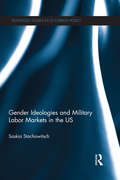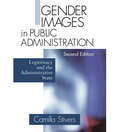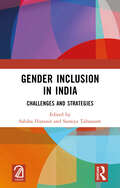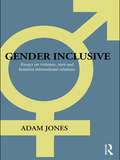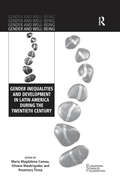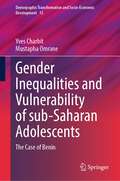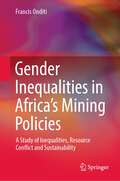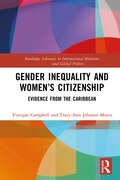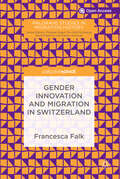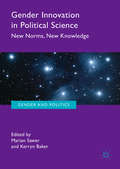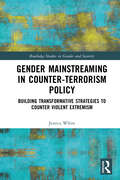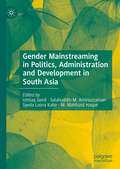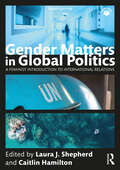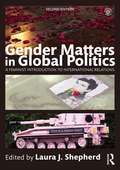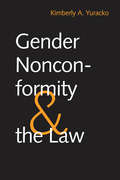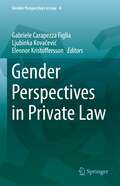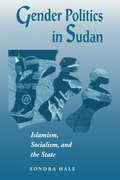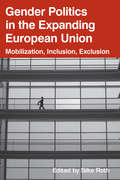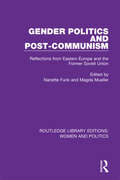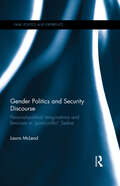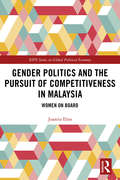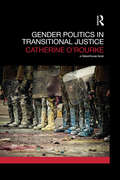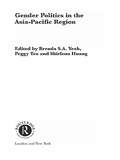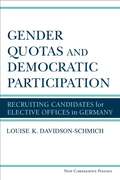- Table View
- List View
Gender Ideologies and Military Labor Markets in the U.S. (Routledge Studies in US Foreign Policy)
by Saskia StachowitschGender Ideologies and Military Labor Markets in the U.S. offers a comprehensive analysis of the relationship between changes in military gender ideologies and structural changes in U.S. military and society. By investigating how social and military change have influenced gender ideologies, the author develops an approach that (re-)connects military gender ideologies to the social conditions of their production and distribution and explains their transformation as effects of changing social and political relations and conflicts. Examining the role of different groups of social actors, media debates on women’s military participation and gender ideologies inherent in depictions of military women, the author seeks to contextualise these ideologies are within structural change in the U.S. military and society, relating them to the gender-specific division of labour on civilian and military labor markets. This work provides a deeper understanding of the nexus between military re-structuring processes, women’s military integration, and changes of gender ideologies in regard to war and the military, and will be of great interest to students and scholars of gender, security studies and American politics.
Gender Images in Public Administration: Legitimacy and the Administrative State (Second Edition)
by Camilla M. StiversExtensively updated to reflect recent research and new theoretical literature, this much-anticipated Second Edition applies a gender lens to the field of public administration, looking at issues of status, power, leadership, legitimacy and change. The author examines the extent of women's historical progress as public employees, their current status in federal, state, and local governments, the peculiar nature of the organizational reality they experience, and women's place in society at large as it is shaped by government.
Gender Inclusion in India: Challenges and Strategies
by Sabiha Hussain Suraiya TabassumThis book not only aims at highlighting existing inequalities between men and women, but also their efforts to overcome these challenges, especially so in women belonging to marginalized communities. It tries to explore systematic denial of rights to marginalized women—opportunities and resources that are normally and easily available to other members of a group, and which are fundamental to social, political integration and observance of human rights such as housing, employment, healthcare, civic engagement and democratic participation. The authors through their in-depth discussions and writings have tried to sketch Equal World as imagined by John Stuart Mill in the opening lines of The Subjugation of Women. This book is co-published with Aakar Books. Print edition not for sale in South Asia (India, Sri Lanka, Nepal, Bangladesh, Pakistan and Bhutan)
Gender Inclusive: Essays on violence, men, and feminist international relations (Routledge Advances in International Relations and Global Politics)
by Adam JonesGender Inclusive offers a challenging and unconventional reinterpretation of gender and mass violence. Compiling essays and excerpts drawn from nearly two decades of Adam Jones’s writing on gender and politics, this stimulating and diverse collection of essays explores vital issues surrounding ‘gendercide’ (gender-selective mass killing) including: How gender shapes men and women as victims and perpetrators of mass violence, including genocide. The range of gender-selective atrocities inflicted upon males, especially the gendercidal killing of civilian men of "battle age." The victimization of women and girls worldwide, including the structural forms of violence ("gendercidal institutions") directed against them. Genocidal violence throughout modern history, with a particular focus on the Balkans and Rwanda. In-depth critiques of prevailing gender framings in academic scholarship, mass media, and the policy sphere. Adam Jones – recently selected as "one of fifty key thinkers in Holocaust and genocide studies" – contests prevailing interpretations of gender and violence, arguing that they fail to capture the broad range of gendered experience. His global-historical treatment is essential reading for anyone with an interest in genocide, human rights and gender studies.
Gender Inequalities and Development in Latin America During the Twentieth Century (Gender and Well-Being)
by Rosemary Thorp María Magdalena Camou Silvana MaubrigadesThis book presents evidence of the evolution of the gender inequalities in Latin America during the twentieth century, using basic indicators of human development, namely education, health and the labour market. There are very few historical studies that centre on gender as the main analytical category in Latin America, so this book breaks new ground. Using case-studies from Argentina, Chile, Colombia, Mexico and Uruguay, the authors show that there is evidence of a correlation between economic growth and the decrease in gender inequality, but this process is also not linear. Although the activity rate of women was high at the beginning of the twentieth century, female participation in the labour market diminished, until the 1970s, when it began to increase dramatically. Since the 1970s, fertility reduction and education improvements and worsening labour market conditions are associated to the steadily increase of women participation in the labour market. By gauging the extent to which gender gaps in the formation of human capital, access to resources, quality of life and opportunities may have operated as a restriction on women’s capabilities and on economic growth in the region, this book demonstrates that Latin America has lagged behind in terms of gender equality.
Gender Inequalities and Vulnerability of sub-Saharan Adolescents: The Case of Benin (Demographic Transformation and Socio-Economic Development #15)
by Yves Charbit Mustapha OmraneThis book analyses the vulnerability of adolescent girls, which results from cumulative inequalities: gender, lack of education, residential, and poverty. It is based on original analyses of data from the national survey carried out by the National Institute of Statistics and Economic Analysis in collaboration with UNICEF.The book discusses three main themes. First, the experience of adolescence: access to globalization, via access to TIC (Trusted Internet Connections) and mass media; subjective well-being; smoking and alcohol consumption; child discipline and domestic violence are discussed. Secondly, the book focusses on the beginning of fertile life: child marriage; early pregnancy; prenatal care; birth weight and breastfeeding. HIV/AIDS and sexuality.The third theme touches on the potential contribution of adolescents to harvesting the demographic dividend: fertility and contraception; postnatal care and vaccination of children; pre-school learning; education and gender; household health vulnerability (water and sanitation). On the basis of the analyses of data, implications regarding concrete policy measures aimed at reducing the vulnerability of adolescents are identified at the end of each chapter.Through the richness of the analyses and the methodological rigor, this book provides an interesting read to both specialists and non-specialists interested in adolescence and the future of Benin, Africa and beyond.The [basis of the] English translation of this book from its French original manuscript was done with the help of artificial intelligence. A subsequent human revision of the content was done by the author.
Gender Inequalities in Africa’s Mining Policies: A Study of Inequalities, Resource Conflict and Sustainability
by Francis OnditiThis book develops a discursive ‘equalitarian’ theoretical framework for studying African mining ecosystem issues and policy interventions. The theory of ‘equalitarianism’ is developed as an alternative to the reductionist approach that has dominated post-colonial debates about the classical jus ad bellum requirements to empower women in development spaces. However, the classical approach narrows the debate down to “women issues,” rather than the ‘whole-of-society.’ As a consequence of this reductionism, women continue to be devalued in the mining sector, characterized by poverty traps, power struggles, and a lack of capacity to engage in large-scale mining (LSM) activities. This book advances principles for a holistic approach, and spells out the implications for women across the mining value chain. Drawing on moral scholarship, the book poses that for women to gain access to strategic spaces in the mining sector, the drive for empowerment must be embedded within ‘whole-of-society’ principles. This book is of interest to scholars researching gender policy, public policy, political philosophy, conflictology, and human geography. It also offers practitioners a guide for evaluating their policy work on mainstreaming gender in the mining sector, presenting options for financing, forging partnership and planning for an inclusive economic development in Africa, and beyond.
Gender Inequality and Women’s Citizenship: Evidence from the Caribbean (Routledge Advances in International Relations and Global Politics)
by Yonique Campbell Tracy-Ann Johnson-MyersGender Inequality and Women’s Citizenship combines cases across Barbados, Guyana, Jamaica and Trinidad and Tobago to highlight the range of systemic inequalities that impact women in the Anglo-Caribbean. Using empirical and secondary data and drawing on feminist theoretical insights, Yonique Campbell and Tracy-Ann Johnson-Myers examine a range of pertinent and intersecting social, political and economic challenges facing women in the Anglo-Caribbean. The issues explored include gender-based violence, barriers to women in politics, the effects of COVID-19 on women, and debates around the illegality of abortion rights and failure to protect the health of women by allowing them to exercise autonomy over their bodies. They raise questions about systemic inequalities resulting from patriarchal gender relations, heteronormativity, women's social and economic status, and state inaction. This book is unique in its interdisciplinary analysis of gender inequality in the Anglo-Caribbean, mapping the intersection of women’s multiple identities and positionalities to determine the obstacles they encounter. It will be of interest to scholars and researchers of International Relations, Caribbean Studies, Gender and Sexuality Studies, Development Studies, Sociology and Anthropology.
Gender Innovation and Migration in Switzerland (Palgrave Studies in Migration History)
by Francesca FalkThis open access book analyses migration and its relation to socio-political transformation in Switzerland. It addresses how migration has made new forms of life possible and shows how this process generated gender innovation in different fields: the changing division of work, the establishment of a nursery infrastructure, access to higher education for women, and the struggle for female suffrage. Seeing society through the lens of migration alters the perspective from which our past and thus our present is told—and our future imagined.
Gender Innovation in Political Science: New Norms, New Knowledge (Gender and Politics)
by Marian Sawer Kerryn BakerIn this book, leading gender scholars survey the contribution of feminist scholarship to new norms and knowledge in diverse areas of political science and related political practice. They provide new evidence of the breadth of this contribution and its policy impact. Rather than offering another account of the problem of gender inequality in the discipline, the book focuses on the positive contribution of gender innovation. It highlights in a systematic and in-depth way how gender innovation has contributed to sharpening the conceptual tools available in different subfields, including international relations and public policy. At the same time, the authors show the limits of impact in core areas of an increasingly pluralised discipline. This volume will appeal to scholars and students of political science and international relations.
Gender Mainstreaming in Counter-Terrorism Policy: Building Transformative Strategies to Counter Violent Extremism (Routledge Studies in Gender and Security)
by Jessica WhiteThis book analyzes policy and programming challenges for gender mainstreaming in counter-terrorism, with examples from comparative case studies of countering violent extremism programming. Interest in the issue of gender in security policy and programming has grown over the past several years, often with increasing pressure at the international and national levels to ensure commitment to inclusion of women or a gender lens. This book provides in-depth investigation of how gender can be effectively understood and included in the security process. Firstly, it adds a timely and effective contribution to the academic conversations around gender in security and how counter-terrorism programming can be implemented with human security goals. Secondly, it offers recommendations for policy makers and practitioners seeking to improve the effectiveness of countering violent extremism program design, implementation, and evaluation. A gender analysis framework is built across the chapters, drawing from various feminist analytical perspectives used in International Relations theory. The learning from this comparative gender analysis is encapsulated in the last chapter through some recommendations to help move counter-terrorism policy toward more transformative gender mainstreaming strategies. This book will be of much interest to students of counter-terrorism studies, countering violent extremism, gender studies, security studies, and International Relations.
Gender Mainstreaming in Politics, Administration and Development in South Asia
by Ishtiaq Jamil Salahuddin M. Aminuzzaman Syeda Lasna Kabir M. Mahfuzul HaqueThis book explores and analyzes gender mainstreaming in South Asia. Gender mainstreaming as a concept is about removing disparities between men and women – about equal access to resources, inclusion and participation in the public sphere, representation in government, and empowerment, all with the aim of achieving equal opportunities for men and women in family life, society, administration, politics, and the economy. The challenges of gender mainstreaming in South Asia are huge, especially in the contexts of patriarchal, religious, and caste-based social norms and values. Men’s dominance in politics, administration, and economic activities is distinctly visible. Women have been subservient to the policy preferences of their male counterparts. However, in recent years, more women are participating in politics at the local and national levels, in administration, and in formal economic activities. Have gender equality and equity been ensured in South Asia? This book focuses on how gender-related issues are incorporated into policy formulation and governance, how they have fared, what challenges they have encountered when these policies were put into practice, and their implications and fate in the context of five South Asian countries. The authors have used varied frameworks to analyze gender mainstreaming at the micro and macro levels. Written from public administration and political science perspectives, the book provides an overview of the possibilities and constraints of gender mainstreaming in a region, which is not only diverse in ethnicity and religion, but also in economic progress, political culture, and the state of governance.
Gender Matters in Global Politics: A Feminist Introduction to International Relations
by Laura J. Shepherd Caitlin HamiltonGender Matters in Global Politics is a comprehensive textbook for advanced undergraduates studying politics, international relations, development and similar courses. It provides students with an accessible but in-depth account of feminist methodologies, gender theory and feminist approaches to key topics and themes in global politics.This textbook is written by an international line-up of established and emerging scholars from a range of theoretical perspectives, bringing together cutting-edge feminist scholarship in a variety of areas.This fully revised and updated third edition: introduces students to feminist and gender theory and explains the relevance to contemporary global politics; explains the insights of feminist theory for a range of fields of study, including international relations, international political economy and security studies; presents feminist approaches to key contemporary issues such as climate change, digital politics, war and militarism, disability and global health; and features pedagogical tools and resources, including discussion questions, suggestions for further reading and online resources. This text enables students to develop a sophisticated understanding of the work that gender does in policies and practices of global politics.Support material for this book can be found at: www.routledge.com/9780367477608.
Gender Matters in Global Politics: A Feminist Introduction to International Relations
by Laura J. ShepherdFully revised and updated, this second edition of Gender Matters in Global Politics is a comprehensive textbook for advanced undergraduates studying feminism & international relations, gender and global politics and similar courses. It provides students with an accessible but in-depth account of the most significant theories, methodologies, debates and issues. This textbook is written by an international line-up of established and emerging scholars from a range of theoretical perspectives, and brings together cutting-edge feminist scholarship in a variety of issue areas. Key features and benefits of the book: Introduces students to the wide variety of feminist and gender theory and explains the relevance to contemporary global politics Explains the insights of feminist theory for a range of other disciplines including international relations, international political economy and security studies Addresses a large number of key contemporary issues such as human rights, trafficking, rape as a tool of war, peacekeeping and state-building, terrorism and environmental politics Features detailed pedagogical tools and resources - seminar exercises, text boxes, photographs, suggestions for further reading, web resources and a glossary of key terms New chapters on - Environmental politics and ecology; War; Terrorism and political violence; Land, food and water; International legal institutions; Peacebuilding institutions and post-conflict reconstruction; Citizenship; Art, aesthetics and emotionality; and New social media and global resistance. This text enables students to develop a sophisticated understanding of the work that gender does in policies and practices of global politics.
Gender Nonconformity and the Law
by Kimberly A. YurackoWhen the Civil Rights Act of 1964 was passed, its primary target was the outright exclusion of women from particular jobs. Over time, the Act's scope of protection has expanded to prevent not only discrimination based on sex but also discrimination based on expression of gender identity. Kimberly Yuracko uses specific court decisions to identify the varied principles that underlie this expansion. Filling a significant gap in law literature, this timely book clarifies an issue of increasing concern to scholars interested in gender issues and the law.
Gender Perspectives in Private Law (Gender Perspectives in Law #4)
by Eleonor Kristoffersson Gabriele Carapezza Figlia Ljubinka KovačevićThis book discusses prominent and controversial gender-related issues across the fields of family law, tort law, labour law, civil procedure law, ADR and private international law. An important critical assumption made by the authors is that the gender equality perspective has been largely neglected in several branches of private law, since scholars researching the intersection between gender and legal studies are mostly focused on public law and human rights law. In light of that, the book contributes not only to the deconstruction of gender-blind private law, but also to the development of a gender-competent analysis of the key branches of private law, starting with private international law. Gender perspective in family law is analyzed on the basis of gendered and heteronormative operations of family law with reference to the formation of legally recognized relationships, the establishment of legal parenthood, the division of marital property after a divorce, and the arrangements for post-separation parenting. Also, regulation of family matters in Indian society and the gender equality perspective from the principle of the child’s best interest are considered. As far as tort law is concerned, the book addresses compensation for damages suffered by women performing unpaid household work. Further, it contains papers dedicated to the following labour law issues: the genesis of labor law and its capacity to contribute either to worsening gender inequality in the world of work or to promoting gender equality; gender segregation in the labour market and its connection to family-friendly policies in the European Union; sexual harassment at work; and the impact of work digitalization on gender-related labour law issues. Lastly, the authors analyze gender equality in civil procedural law, as well as in mediation as a tool for encouraging the peaceful settlement of disputes. The book is intended to improve awareness of the wide range of private law issues that are important for understanding the ways in which gender inequality shapes everyday experiences, while also presenting critical considerations of the key private law instruments for achieving gender equality.
Gender Politics In Sudan: Islamism, Socialism, And The State
by Sondra HaleFocusing on the relationship between gender and the state in the construction of national identity politics in twentieth-century northern Sudan, the author investigates the mechanisms that the state and political and religious interest groups employ for achieving political and cultural hegemony. Hale argues that such a process involves the transformation of culture through the involvement of women in both left-wing and Islamist revolutionary movements. In drawing parallels between the gender ideology of secular and religious organizations in Sudan, Hale analyzes male positioning of women within the culture to serve the movement. Using data from fieldwork conducted between 1961 and 1988, she investigates the conditions under which women's culture can be active, generative, positive expressions of resistance and transformation. Hale argues that in northern Sudan women may be using Islam to construct their own identity and improve their situation. Nevertheless, she raises questions about the barriers that women may face, now that the Islamic state is achieving hegemony, and discusses the limits of identity politics.
Gender Politics In The Expanding European Union: Mobilization, Inclusion, Exclusion
by Silke RothIn May 2004, after bringing their legislation into accordance with EU regulations, ten more countries joined the European Union. The contributors to this volume assess the impact of this historical development on gender relations in the new and old EU member states. Instead of focusing on either western or eastern Europe, this book investigates the similarities and differences in diverse parts of Europe. Although initially limited, gender equality was part of the original framework of the European Union, an organization often more open than national governments to feminist demands, as this volume illustrates with case studies from eastern and western Europe. The enlargement process thus provides some important policy instruments for increasing equality between men and women.
Gender Politics and Mass Dictatorship
by Karen Petrone Jie-Hyun LimUsing mass dictatorship as a working hypothesis to comprehend support for dictatorship from below, this book concentrates on the gender politics deployed by dictatorial regimes such as Nazism, Stalinism, 'really existing socialism' in the GDR and People's Poland, Maoist China, the development dictatorship in South Korea, and colonial empires. 20th century dictatorial regimes used gender politics as a lever to mobilize men and women as voluntary participants in state projects. Ironically enough, women under dictatorships could become important players in the previously male-dominated public sphere in exchange for voluntary mobilization. But both men and women were not passive objects of gender politics. Men both embraced and rejected the masculine roles set out for them; and the dictatorial regimes' invitation to participate in the public sphere, designed for the self-mobilization of women, was often used by women for self-empowerment. This book shows the twisted paths of citizens' lives under the dictatorial regimes as they veered between self-mobilization and self-empowerment.
Gender Politics and Post-Communism: Reflections from Eastern Europe and the Former Soviet Union (Routledge Library Editions: Women and Politics)
by Nanette Funk Magda MuellerIn the wake of communism’s decline, women’s concerns had become increasingly important in Eastern Europe and the former Soviet Union. Yet most discussions of post-communism changes had neglected women’s experiences. Originally published in 1993, this title was the first collection of its kind, presenting original essays by women scholars, politicians, activists, and former dissidents from Eastern Europe and the former Soviet Union, along with essays by Western feminists and scholars. They discuss gender politics during the often turbulent transition and crises of post-communism, offering vivid accounts and analyses of the conditions facing women in each country.
Gender Politics and Security Discourse: Personal-Political Imaginations and Feminism in 'Post-conflict' Serbia (War, Politics and Experience)
by Laura McLeodThis book investigates competing modes of thought about gender security and aims to understand the policy implications of personal-political imaginations. The work draws upon extensive research conducted by the author in Serbia to develop a comprehensive picture of how feminist and women’s organising relates to the broader national and international contexts surrounding gender security. Through an innovative analytical framework of personal-political imaginations, the book explores the role that memories, perceptions and hopes about conflict and post-conflict have upon the logics of gender security. It investigates how contrasting and competing modes of thought about ‘gender security’ are made, paying attention to how the dynamics of gender politics in Serbia shape the security discourse and narratives of activists. The volume explores in detail how feminist and women’s organisations have responded to UNSCR 1325 by analysing two policy debates and campaigns that seek to ‘achieve’ its goals and gender security in Serbia: (1) feminist antimilitarism and (2) connecting domestic violence to the abuse of small arms and light weapons. Ultimately, the book argues that the configuration of gender security discourse is intimately linked to personal-political imaginations of conflict and post-conflict. This book will be of much interest to students of gender politics, conflict studies, critical security studies, European politics and IR in general.
Gender Politics and the Pursuit of Competitiveness in Malaysia: Women on Board (RIPE Series in Global Political Economy)
by Juanita EliasThis book is concerned with how the pursuit of national economic competitiveness by states has come to be intertwined with a globalised gender agenda—one in which women and the household economy are seen as &‘untapped&’ resources. In many East and Southeast Asian economies, competitiveness and the dangers of the middle-income trap dominate economic policy agendas: states&’ commitments to gender equality goals are frequently framed around &‘business case&’ logics in which women&’s empowerment and women&’s increased engagement in the productive economy is linked to the national economic project of building and enhancing competitiveness. This book looks to the case of Malaysia in order to assess how the increasingly dominant view that gender equality is &‘smart economics&’ plays out in practice. Drawing upon extensive case study research and interview data, the book hones in on the complex gender politics that are at work within government initiatives that seek to enhance competitiveness via increasing women&’s labour force participation, efforts to strengthen marriage and family life, and attempts to boost women&’s entrepreneurialism and status within the corporate world. Providing an account of the gender politics at work within ongoing processes of state transformation in Asia, this book will appeal to researchers and students in gender studies, Southeast Asian studies, International Political Economy and public policy.
Gender Politics in Transitional Justice
by Catherine O'RourkeWhat role do transitional justice processes play in determining the gender outcomes of transitions from conflict and authoritarianism? What is the impact of transitional justice processes on the human rights of women in states emerging from political violence? Gender Politics in Transitional Justice argues that human rights outcomes for women are determined in the space between international law and local gender politics. The book draws on feminist political science to reveal the key gender dynamics that shape the strategies of local women’s movements in their engagement with transitional justice, and the ultimate success of those strategies, termed ‘the local fit’. Also drawing on feminist doctrinal scholarship in international law, ‘the international frame’ examines the role of international law in defining harms against women in transitional justice and in determining the ‘from’ and ‘to’ of transitions from conflict and authoritarianism. This book locates evolving state practice in gender and transitional justice over the past two decades within the context of the enhanced protection of women’s human rights under international law. Relying on original empirical and legal research in Chile, Northern Ireland and Colombia, the book speaks more broadly to the study of gender politics and international law in transitional justice.
Gender Politics in the Asia-Pacific Region (Routledge International Studies of Women and Place #No.3)
by Brenda S.A. Yeoh Peggy Teo Shirlena HuangAmidst the unevenness and unpredictability of change in the Asia-Pacific region, women's lives are being transformed. This volume takes up the challenge of exploring the ways in which women are active players, collaborators, participants, leaders and resistors in the politics of change in the region. The editors focus attention on the politics of gender as a mobilizing centre for identities, and the ways in which individualized identity politics may be linked to larger collective emancipatory projects based on shared interests, practical needs, or common threats. Collectively, the chapters illustrate the complexity of women's strategies, the diversity of sites for action, and the flexibility of their alliances as they carve out niches for themselves in what are still largely patriarchal worlds. This book will be of vital interest to scholars in a range of subjects, including gender studies, human geography, women's studies, Asian studies, sociology and anthropology.
Gender Quotas and Democratic Participation
by Louise K. Davidson-SchmichSince the 1970s, quotas for female political candidates in elections have proliferated worldwide. Beyond increasing the numbers of women in high-level elected bodies and, thereby, women's political representation, advocates claim that quotas foster gender-equal participation in democracy and create female role models. According to this reasoning, quotas also overcome barriers to women's political participation, especially discriminatory practices in the selection of electoral candidates. Though such claims have persuaded policymakers to adopt quotas, little empirical evidence exists to verify their effects. In Gender Quotas and Democratic Participation, Louise K. Davidson-Schmich employs a pathbreaking research design to assess the effects of gender quotas on all phases of political recruitment. Drawing on interviews with, and an original survey of, potential candidates in Germany, she investigates the extent to which quotas and corresponding increases in women's descriptive representation have resulted in similar percentages of men and women joining political parties, aspiring to elected office, pursuing ballot nominations, and securing selection as candidates. She also examines the effect of quotas on discriminatory selection procedures. Ultimately, Davidson-Schmich argues, quotas' intended benefits have been only partially realized. Quotas give women greater presence in powerful elected bodies not by encouraging female citizens to pursue political office at rates similar to men's, but by improving the odds that the limited number of politically ambitious women who do join parties will be elected. She concludes with concrete, original policy recommendations for increasing women's political participation. Book jacket.
